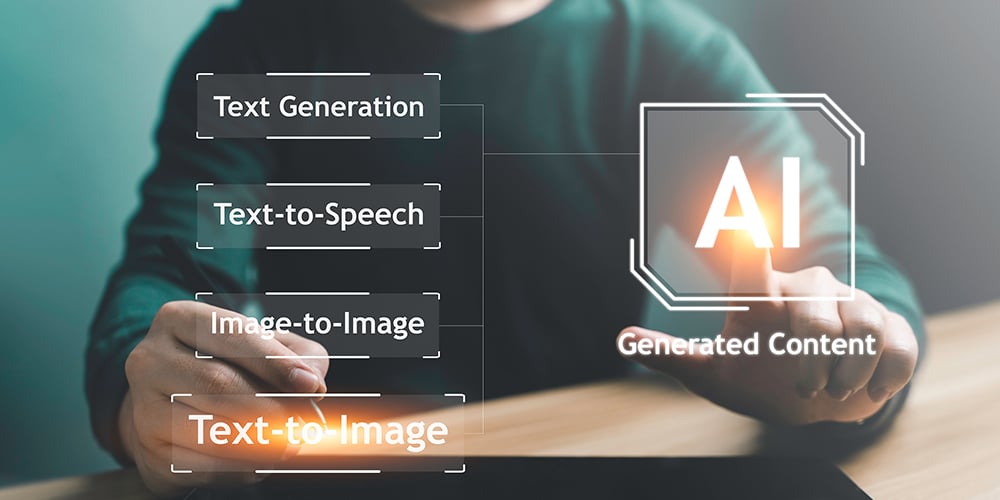The digital landscape continues to evolve at a rapid pace, offering a wealth of information and opportunities. However, despite these advancements, a significant portion of the population faces barriers to accessing this digital world. According to the World Health Organization, roughly 1 billion people globally experience some form of disability. This translates to a vast audience who may struggle to interact with websites, applications, and online content due to accessibility limitations.
This blog delves into the transformative potential of generative AI for crafting a more inclusive digital experience for everyone. We’ll explore the current challenges of accessibility, the transformative role generative AI can play, and practical applications for content creation. We’ll also address crucial considerations and ethical concerns surrounding AI implementation.
Understanding the Accessibility Challenges in the Digital World
Digital accessibility refers to the design and development of online content that is usable by everyone, regardless of their ability. This encompasses a broad spectrum of needs, including visual impairments, hearing disabilities, cognitive limitations, motor dexterity issues, and more.
Common barriers to digital accessibility include:
- Lack of alternative text descriptions for images, which hinders understanding for users who rely on screen readers.
- Inaccessible video content lacking closed captions or transcripts.
- Websites with poor color contrast or complex navigation, making them difficult for users with visual impairments or motor limitations to navigate.
- Content that lacks keyboard accessibility, hindering users who rely on assistive technologies for navigation.
These limitations create a significant digital divide, excluding people with disabilities from the wealth of information and resources available online.
How Generative AI Can Revolutionize Accessibility
Generative AI, a branch of artificial intelligence focused on content creation, offers a transformative approach to overcoming these accessibility hurdles. By leveraging advanced machine learning algorithms, generative AI tools can automate tasks and generate content that caters to diverse user needs.
Here are some key ways generative AI can revolutionize accessibility:
- Automated Image Descriptions: AI can analyze images and generate accurate alt text descriptions, allowing screen readers to convey image content to users with visual impairments.
- Automated Captioning and Transcription: AI can automatically generate closed captions and transcripts for video content, ensuring comprehension for users who are deaf or hard of hearing.
- Real-time Text-to-Speech Conversion: Generative AI can convert written content into natural-sounding audio, making websites and documents accessible for users with reading difficulties.
- Personalized Content Adaptation: AI can personalize content based on user preferences and accessibility needs. For example, adjusting font size, color contrast, or text spacing for improved readability.
Empowering Users with Disabilities through AI-Generated Content
By leveraging generative AI for accessibility, we can create a more inclusive digital world that empowers users with disabilities. Here’s how:
- Improved User Experience: AI-generated content ensures users don’t miss out on information because of accessibility limitations, leading to a more seamless and enjoyable user experience.
- Increased Access to Information: Automated content adaptations and generation allow users with disabilities to access a wider range of digital resources, fostering greater equality in the online world.
- Enhanced Independence: AI tools empower users with disabilities to navigate the digital landscape independently, without relying on external assistance.
Practical Applications of Generative AI for Accessible Content Creation
The potential applications of generative AI for accessible content creation are vast. Here are some practical examples:
- Automated accessibility checks: AI can analyze websites and applications, identifying and flagging potential accessibility issues for developers to address.
- AI-powered content authoring tools: These tools can provide real-time suggestions for improving content readability, color contrast, and keyboard navigation.
- Scalable accessibility solutions: AI can automate many accessibility adjustments, making it easier for content creators to manage accessibility across large volumes of content.
Challenges and Considerations in Implementing Generative AI for Accessibility
While generative AI offers tremendous potential, it’s crucial to address potential challenges and ethical considerations:
- Ethical AI: Ensuring AI-generated content is unbiased and inclusive is paramount. Training data sets must be diverse and representative to avoid perpetuating existing biases.
- Data Privacy: Data security and user privacy must be prioritized when using AI for content generation and accessibility adaptations.
- Regulatory Frameworks: Understanding and following evolving accessibility regulations is essential to ensure compliance with mandated accessibility standards.
- User-Centric Design: User feedback and testing are crucial throughout the development process to ensure AI-generated content truly meets the diverse needs of users with disabilities.
Generative AI presents a paradigm shift in creating a more inclusive digital future. By leveraging its capabilities, we can bridge the digital divide and ensure everyone can access the vast information and opportunities offered by the online world. As we move forward, it’s essential to embrace generative AI as a valuable tool for driving accessibility and fostering a more equitable digital landscape.
Integra’s advanced generative AI solutions offer cutting-edge tools and services to help organizations achieve these goals. By partnering with Integra, you can:
- Automate accessibility tasks: streamline content creation and ensure compliance with accessibility standards.
- Enhance user experience: Create inclusive digital experiences that cater to diverse user needs.
- Drive innovation: Leverage the power of AI to unlock new possibilities for accessible content.
Contact Integra today to learn more about how our generative AI solutions can help you create a more accessible and inclusive digital world.


